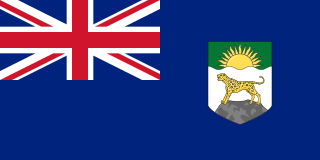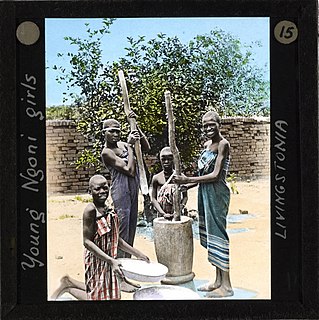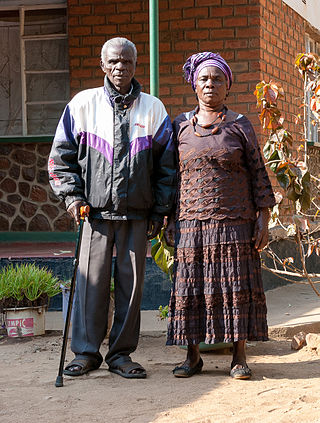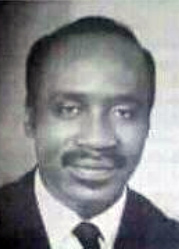The History of Malawi covers the area of present-day Malawi. The region was once part of the Maravi Empire. In colonial times, the territory was ruled by the British, under whose control it was known first as British Central Africa and later Nyasaland. It became part of the Federation of Rhodesia and Nyasaland. The country achieved full independence, as Malawi, in 1964. After independence, Malawi was ruled as a one-party state under Hastings Banda until 1994.

Nyasaland was a British protectorate located in Africa that was established in 1907 when the former British Central Africa Protectorate changed its name. Between 1953 and 1963, Nyasaland was part of the Federation of Rhodesia and Nyasaland. After the Federation was dissolved, Nyasaland became independent from Britain on 6 July 1964 and was renamed Malawi.

The British Central Africa Protectorate (BCA) was a British protectorate proclaimed in 1889 and ratified in 1891 that occupied the same area as present-day Malawi: it was renamed Nyasaland in 1907. British interest in the area arose from visits made by David Livingstone from 1858 onward during his exploration of the Zambezi area. This encouraged missionary activity that started in the 1860s, undertaken by the Universities' Mission to Central Africa, the Church of Scotland and the Free Church of Scotland, and which was followed by a small number of settlers. The Portuguese government attempted to claim much of the area in which the missionaries and settlers operated, but this was disputed by the British government. To forestall a Portuguese expedition claiming effective occupation, a protectorate was proclaimed, first over the south of this area, then over the whole of it in 1889. After negotiations with the Portuguese and German governments on its boundaries, the protectorate was formally ratified by the British government in May 1891.

Ntcheu is a district in the Central Region of Malawi. It borders with the country of Mozambique. The district headquarters is Ntcheu, known as BOMA in the local language, but is most commonly called Mphate. It is run by Yeneya, the village headman. The district covers an area of 3,424 km.² and has a population of 659,608 people according to the 2018 Malawi Population and Housing Census. The Ntcheu district lies around halfway between Malawi's majors cities of Blantyre and Lilongwe - the capital city.

The Ngoni people are an ethnic group living in the present-day Southern African countries of Malawi, Mozambique, Tanzania, Zimbabwe, and Zambia. The Ngoni trace their origins to the Nguni and Zulu people of kwaZulu-Natal in South Africa. The displacement of the Ngoni people in the great scattering following the Zulu wars had repercussions in social reorganization as far north as Malawi and Zambia.
Dunduzu Kaluli Chisiza (8 August 1930 – 2 September 1962), also known as Gladstone Chisiza, was an African nationalist who was active in the independence movements in Rhodesia and Nyasaland, respectively present-day Zimbabwe and Malawi.

The Zambia Independence Act 1964 was an act of the Parliament of the United Kingdom which granted independence to Zambia with effect from 24 October 1964. It also provided for the continuation of a right of appeal from Zambia to the Judicial Committee of the Privy Council. It was introduced by Andrew Cavendish, 11th Duke of Devonshire Under-Secretary of State for Commonwealth Relations.

Sir Alfred Sharpe was Commissioner and Consul-General for the British Central Africa Protectorate and first Governor of Nyasaland.
Inyandezulu Inkosi Yamakhosi Mphezeni KaZwangendaba is the King of the Ngoni people of Zambia's Eastern Province, East Africa and Malawi's Mchinji district. He is from the lineage of Prince Jele KaMfeka of the Ncwangeni Nguni family. His mother was Queen Soseya Nxumalo of the Ndwandwe royal house. Both his motherm and her elder sister, Queen Loziwawa were nieces of King Zwide.

The Federation of Rhodesia and Nyasaland, also known as the Central African Federation (CAF), was a colonial federation that consisted of three southern African territories: the self-governing British colony of Southern Rhodesia and the British protectorates of Northern Rhodesia and Nyasaland. It existed between 1953 and 1963.
James Ralph Nthinda Chinyama was a leading member of the Nyasaland African Congress (NAC) during the period of British colonial rule in Nyasaland, which became the independent state of Malawi in 1964.
Charles Jameson Matinga was a politician in Nyasaland before the colony obtained independence from the British.
Desmond Dudwa Phiri, commonly known as D. D. Phiri, was a Malawian author, economist, historian, and playwright. He was born in Mzimba, Malawi, and was the Principal and proprietor of the Aggrey Memorial School in Blantyre. He published 17 books in the fields of history, sociology and economics and was recognized by the Pan-African Writers' Association (PAWA) as one of the top 23 authors in Africa in 2011. He was a regular columnist in The Nation newspaper. He died on 24 March 2019 at Mwaiwathu Private Hospital in Blantyre

The Chikulamayembe are a dynasty of kings established among the Tumbuka people in the Nkhamanga-Henga area of Northern Malawi. The Chikulamayembe originally ruled from around 1805, becoming weaker from the 1830s and losing power by the 1870s and their dynasty was re-established in 1907.
Kwataine is a traditional authority under the paramount chief, Inkosi Yamakosi Gomani in Ntcheu District, Malawi most well known for its safe motherhood projects. This traditional authority area consists of an estimated 500,000 people, largely of Ngoni origin.

Albert Andrew Muwalo Gandale Nqumayo was a prominent politician in Malawi from the 1960s until he was sacked in 1976 and was executed in 1977. He entered politics in the mid 1950s through involvement in a hospital worker's trade union and membership of the Nyasaland African Congress, where his activities led to his detention without trial during the 1959 State of Emergency in Nyasaland. After his release, he joined the Malawi Congress Party (MCP), and became locally prominent in Ntcheu District as district MCP chairman and from 1962 as Member of Parliament for Ntcheu South. In 1963, he became Administrative Secretary of the MCP, and he was a prominent supporter of the then-Prime Minister, Hastings Banda during the Cabinet Crisis of 1964. Muwalo was rewarded for his loyalty with the cabinet post of Minister of Information in 1964, and in 1966 he became Minister of State in the President's Office. His close contact with Banda, both as minister in Banda's office and in the MCP gave him great power and, during the first half of the 1970s he and his relative, the Head of the Police Special Branch Focus Gwede, were heavily involved in the political repression of actual or suspected opponents of the Banda regime. In 1976 he and Gwede were arrested: the reasons for their arrests were unclear, but may have resulted from a power struggle among those around the ageing president or simply because he became too powerful and may have been seen by Banda as a threat. In 1977, the two were tried before a Traditional Court and after a trial whose fairness was in serious doubt, were both sentenced to death. Gwede was reprieved, but Muwalo was hanged on 3 September 1977.
Since 1933, various traditional chiefs in Nyasaland have been designated as Native Authorities, initially by the colonial administration, and they numbered 105 in 1949.. They represented a form of the Indirect rule which had become popular in British African dependencies in the second quarter of the 20th century, although Nyasaland's Native Authorities had fewer powers and smaller incomes than similar institutions in other African colonies. The Native Authority system worked reasonably effectively until after the Second World War, when they were obliged to enforce unpopular government agricultural policies and, in some cases, their support for the Federation of Rhodesia and Nyasaland made Native Authorities unpopular with many of their people. After 1953, many of the powers of individual chiefs were transferred to councils which became the Native Authorities, although the chiefs sat on these councils. After independence, the authorities were renamed Traditional Authorities and continued to operate, and the status and influence of many of the chiefs revived through their cooperation with the Malawi government of Hastings Banda.
Leroy Vail whose birth name was Hazen Leroy Vail, was an American specialist in African studies and educator who specialized in the history and linguistics of Central Africa and later extended his interests to Southern Africa. He taught in universities in Malawi, Zambia and the United States and his research in the first two countries inclined him toward the view that Central Africa underwent a period of underdevelopment that began in the mid-19th century and accelerated under colonial rule. After his return to the United States, he cooperated with Landeg White on studies of colonial Mozambique and on the value of African poetry and songs as a source of oral history.
Inkosi Ya Makhosi M'mbelwa V is the reigning King of the Ngoni and Tumbuka people in Malawi, Zambia and Tanzania. M'mbelwa V is the fifth surviving son of the great-grandfather King Zwangendaba Jele and Queen Munene of the Nzima clan of present-day Eswatini. M'mbelwa V inherited his father's kingdom when he passed away in February 2013 at Mwaiwathu Private Hospital in Malawi's commercial city, Blantyre, where he was diagnosed with diabetes attack and hypertension. During his death, he was 56 years old. M'mbelwa V's headquarters is in Edingeni, Mzimba. He is married to Inkosikazi M'mbelwa V. During COVID-19 in 2020, he instructed the government to avoid mass gatherings of people.
Zongendawa Jere or Inkosi Ya Makhosi M'mbelwa IV was the King of the Ngoni and Tumbuka people in Malawi, Zambia and Tanzania. He passed away in February 2013 at Mwaiwathu Private Hospital in Malawi's commercial city, Blantyre, where he was diagnosed with diabetes attack and hypertension. At his death, he was 60 years old. His son, M'Mbelwa V, inherited the crown in 2013.









